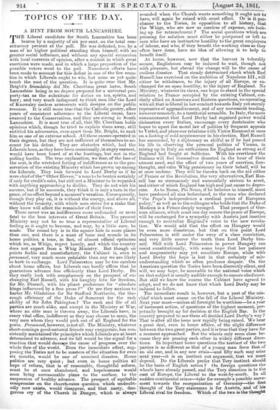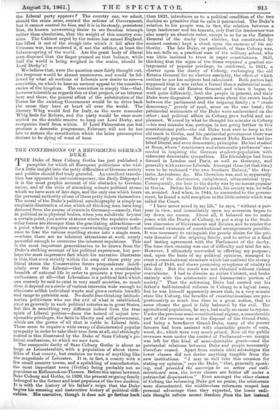TOPICS OF THE DAY.
A HINT FROM SOUTH LANCASHIRE.
THE Liberal candidate for South Lancashire has been beaten by a majority of six per cent. on the total con- stituency present at the poll. He was defeated, too, by a man of no higher political standing than himself, with no greater social influence, and without any special connexion with local currents of opinion, after a contest in which great exertions were made, and in which a large proportion of the possible voters went to the poll. Numerous efforts have been made to account for this defeat in one of the few coun- ties in which Liberals ought to win, but none as yet quite touch the root of the question. It is quite true that Mr. Bright's friendship did Mr. Cheetham great harm, South Lancashire being in no degree prepared for a universal pro- perty-tax as the substitute for duties on tea, spirits, and beer ; and very much indisposed to think men like the Lord of Knowsley useless aristocrats with designs on the public revenue. It is still more true that the Catholic gentry, after years of consistent adherence to the Liberal cause, have swerved to the Conservatives, and they are strong in South Lancashire. It is most true of all, that Mr. Cheetham holds opinions which, though ho tried to explain them away, still entitled his adversaries, even apart from Mr. Bright, to rank him as one of an extreme school. All these causes operated in their degrees, but they are not sufficient of themselves to ac- count for his defeat. They are obstacles which, had the Liberals been, as they have been occasionally, in angry earnest, would have been heard of at the hustings, but not in the polling booths. The true explanation, we fear, of the loss of the seat, is the wretched feeling of indifference as to the pre- servation of the existing Ministry which has grown up among the Liberals. They look forward to Lord Derby as if he were chief of the" Other Eleven," a man to be beaten certainly if only for credit's sake, but still not a Minister to be regarded with anything approaching to dislike. They do not wish his success, but if he succeeds, they think it is only a turn in the game, of no effect beyond a moment's vexation. Consequently, though they play on, it is without the energy, and above all, without the tenacity, with which men strive for a stake that they know will affect .the remainder of their lives.
There never was an indifference more unfounded or more fatal to the best interests of Great Britain. The present Ministry may not be so true a representative of Liberal feeling as it ought to become, and may, by a little care, be made. The round key is in the square hole in more places than one, and there is a want of bone and muscle in its home politics, a tone, in fact, of almost official optimism which we, as Whigs, regret keenly, and which the country does not expect from a Whig Ministry. But though on points feeble and unsatisfactory, the Cabinet is, even in personnel, very much more palatable than any we are likely to havb in exchange. Lord Palmerston may be too careless about home affairs, but 'Liberals can hardly affirm that he guarantees advance less efficiently than Lord Derby. Do they really look with complacency on the prospect of ex- changing Earl Russell, with his haughty love for freedom, for Mr. Disraeli, with his pliant preference for " absolute kings influenced by a free press ?" Or 'are they anxious'to barter Mr. Gladstone for Sir Stafford Northcote, the tho- rough efficiency of the Duke of Somerset for the rash ability of Sir John Pakington ? The rank and file of all parties are much alike, and except in the Ministry at War, where an able man is thrown away, the Liberals have, in every vital office, indifferent as they may choose to seem, the very men whom they would pick out of all England for the posts. Personnel, however, is not all. The Ministry, whatever short-comings good-natured friends may exaggerate, has con- sistently maintained the principles which Liberals are at heart determined to advance, and its fall would be the signal for a reaction that would damage the cause of progress over the whole face of the world. Even the immediate effect, sup- posing the Tories not to be masters of the situation for even six months, would be one of unmixed disaster. Home politics are very quiet ; but even in home politics pe of reform, that is of reasonable, thoughtful reform, must be at once abandoned, and hopelessness would soon bring unreasonable plans to the surface, to the suspension of healthy advance. The prospect of equitable compromise on the church-rates question which undoubt- edly now exists, would disappear, and that nasty, dan- gerous cry of the Church in Danger, which is always sounded when the Church wants something it ought not to have, will again be raised with cruel effect. Or is it per- chance to the Tories, in opposition to all history, that the Whigs, who are now so careless of expense, are look- ing up for retrenchment ? The social questions which are pressing for solution must either be postponed or left to men who have as instinctive hostility to the great employers of labour, and who, if they benefit the working class as they often have done, have no idea of allowing it to help to benefit itself.
At home, however, now that the harvest is tolerably secure, Englishmen may be induced to wait, though not with pleasure, but abroad the change will be the cause of endless disaster. That steady determined check which Earl Russell has exercised on the ambition of Napoleon III., will either be withdrawn, to the injury of all Europe, or ex- changed for an open hostility, to the injury of England. No Ministry, whatever its views, can hope to stand in the special relation to France occupied by the existing Cabinet, cor- dially allied on American and Eastern questions, co-operating with all that is liberal in her conduct towards Italy yet sternly repressive of aggrandizement, and of any movement tending, however remotely, to a territorial scramble. In Italy, the mere announcement that Lord Derby had regained power would dishearten every Italian, encourage every doctrinaire who hopes to upset the moral law of •politics by frequent appeals to Vattel, and place our relations with Victor Emanuel at once on a footing of cold acquiescence in his election. Earl Russell has succeeded, by a diplomacy as skilful as if be had passed his life in observing the personal politics of Vienna, in raising up in Italy an enthusiasm for England as strong as if England had fought at Solferino. With his overthrow the Italians will feel themselves deserted in the hour of their utmost need, and the effect of two years of exertion, fore- thought, and calm Whig persistency on their behalf, will be at once undone. They will be thrown back on the aid either of France or the Revolution, the very alternatives„Earl Rus- sell has so strenuously and successfully striven to avert, and either of which England has high and just cause to depre- cate. As to Rome,.Pio Nono, if he believes in himself, must have pardoned all sins beforehand, to the man who declared " the Pope's independence a cardinal point of European policy," as well as to the colleague who holds that the Duke of Modena is a Prince deeply wronged. That prospect of Ger- man alliance, which must one day secure the peace of Europe, will be exchanged for a sympathy with Austria just inactive enough to neutralize England's voice in the new revolu- tion. We would add that the effect on Hungary would be even more disastrous, but that on this point Lard Palmerston is still under the sway of a class conviction, and very little nearer the truth than Lord Derby him- self. Still with Lord Palmerston in power Hungary can resist constitutionally, with some hope that her patience and magnanimity may yet conciliate Europe, while with Lord Derby the hope is lost in that certainty of mis- understanding which so often produces despair. On the American question the Tories have been discreetly silent, and will, we may hope, be amenable to the national voice which on that subject is usually audible enough to ensure obedience. But still we know the course the Cabinet have agreed to adopt, and we do not know that which Lord Derby may he induced to follow.
The immediate result is, however, but a part of the mis- chief which must ensue on the fall of the Liberal Ministry. Next year must—unless all foresight be worthless—be a year of incessant action, of questions of the highest moment, per- petually brought up for decision at the English Bar. Is the country prepared to see them all decided.Lord Derby's way ? That is after all the issue now rapidly being raised. We hear a great deal, even in home affairs, of the slight difference between the two gr, eat parties, and it is true that they have for a moment approached. But the wheels only seem close be- cause they are passing each other in widely different direc- tions. In important home questions the instinct of the two parties is as different as that of a young man from that of an old one, and in any new crisis—and fifty such may arise next year—it is on instinct not argument, that we must depend. Do the Liberals prefer that Tory instinct should be the basis of' English action On foreign questions the wheels have already passed, and the Tory direction is to the east of Europe, the Liberal to the west-by-south. In all sudden continental crises—take for example a possible move- ment towards the reorganization of Germany—the first thought of the Tory statesman is for Austria, and of his Liberal rival for freedom. Which of the two is the thought the Liberal party approve ? The country can, we admit, should the crisis arise, control the actions of Government, but it cannot control its bias, and it is in its steady, persistent bias, its known unswerving desire to see freedom triumph rather than absolutism, that the weight of this country con- sists. The Cabinet urged by the nation has armed England, has lifted it out of the slough into which it fell after the Crimean war, has rendered it, if not the arbiter, at least the balance-spring of the world. Are the great body of liberal men disposed that the finger pressed on that balance, while half the world is being weighed in the scales, should be Lord Derby's? We believe that, were the question once fairly thought out, the response would be almost unanimous, and would be fol- lowed by what all sections of Liberals now desire to see—a conviction, on which to base an earnest appeal to the constitu- encies of the kingdom. The conviction is simply this—that, however tolerable as regards this or that project, or an interest here and there, the general effect of the substitution of the Tories for the existing Government would be to drive back the cause they have at heart all over the world. The literary Whig would feel for Italy, as the more muscular Whig feels for Reform, and the party would be once more united on the double resolve to keep out Lord Derby, and reorganize itself from within. If Lord Palmerston can but produce a domestic programme, February will not be too late to restore the constitution which the heirs presumptive declare to be dying of want of tone.































 Previous page
Previous page